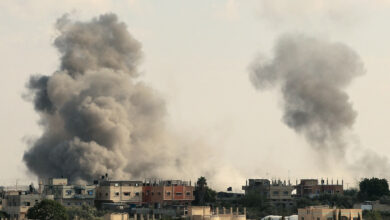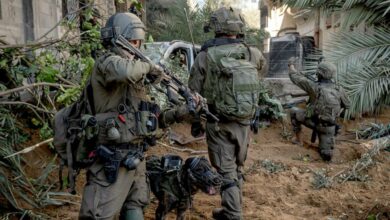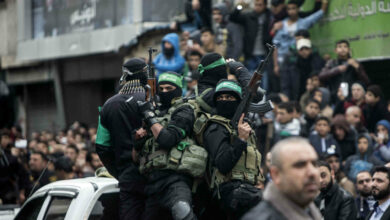
The most tense and frequently-discussed aspect of the Syrian conflict in recent months has been the growing confrontation between Israel on one side and the Iranian axis on the other. With the two sides starting to openly clash, tensions appear poised to reach new heights as the Syrian government and its allies look to capture the last rebel-held areas separating their zone of control from the Israeli-held Golan Heights.
Russia has been largely toothless to check the development of this trajectory to date, even appearing sometimes to care little about the issue. While Moscow now appears to be taking the threat of international conflict in southwest Syria seriously, even the best options available to it are unlikely to significantly curtail its escalation.
Southern Syria had been the one area outside of regime control with reasons to hope the devastation of a government offensive to retake it might be avoided. The region was one of the four “de-escalation zones” agreed by the Astana talks troika of Russia, Iran and Turkey, although the former two have happily aided the regime in its conquest of half of these zones (East Ghouta and north Homs). An agreement signed last July between Russia, the United States and Jordan on a truce in south Syria provided a more robust basis for the security of this corner of the country.
This deal has recently been challenged by the appearance of Iranian Revolutionary Guard Corps and Hezbollah units in the western part of this sector, near the Israeli-controlled Golan Heights. Israel has made it clear this presence is unacceptable, and repeatedly launched airstrikes in an escalating show of force against Tehran and its Lebanese proxy.
While Russia, regardless of its ceasefire commitments, is presently supporting a Syrian government offensive in the eastern sector of Daraa province, it has committed to defusing tensions in the west, declaring that “only the Syrian army” should be present there and reportedly promising Israel to remove non-regime forces from the area.
This commitment begs the question of how Moscow will actually enforce the departure of Iranian forces and Hezbollah from southwest Syria and prevent further deployments. The three most plausible strategies entail: physical pressure, through deploying military police; inducement, through withholding air support; and diplomatic, by delaying final resolution of the issue until future multilateral talks. All three are fraught with their own risks and none guarantee a decisive solution to the problem, but such is the nature of Russia’s position in Syria.
Russian military police
The most straightforward method available to Moscow would be the dispatch of several battalions of military police to ensure the departure of Tehran’s forces. Primarily composed of Chechen and other North Caucasian Sunni Muslim servicemen, Russia’s military police have proved a valuable tool in the Kremlin’s arsenal in Syria, overseeing successful ceasefires and winning trust from the local populace over the past 18 months. They have also had past altercations with Iranian and regime forces, reportedly standing off with the former during an Assad health scare earlier last year and arresting the latter as they looted southern Damascus in May.
Military police are also not particularly politically sensitive domestically to expand the deployment of: their status as non-ethnic Russians means the majority of the country is little concerned with their fate, while Chechen leader Ramzan Kadyrov has declared his willingness to deploy more of his troops to Syria. In short, military police have proved the Kremlin’s most effective method of enforcing its will on the ground in Syria.
Their success in this scenario is not assured, however. While Russia has some relationship with Hezbollah, having worked closely alongside the group in previous military offensives in Aleppo and elsewhere, their recent interactions have seen tensions as their goals diverge.
Hezbollah allegedly rejected the deployment of Russian servicemen to Qusayr, a town near the Lebanese border recaptured from rebels in the Shia militia group’s first major operation in the Syrian conflict in April 2013. Tellingly, Moscow backed down in this instance, withdrawing its personnel in a move that suggests the Kremlin is not willing to risk escalation with its allies in order to enforce its will.
Ultimately, attempting to have military police restrain Russia’s erstwhile allies in the southwest would ultimately come down to a question of wills: which side is willing to escalate more? This is a hard question to answer, but there is much to suggest Moscow would be on the losing side.
Withholding air support
A more indirect Russian tactic could be withholding air support for the likely upcoming Golan-area assault. This would allow Moscow to send a message to its allies regarding what it will and will not allow, as air support proved crucial in quickly breaking rebel resistance in Ghouta and saving hundreds, perhaps even thousands of pro-regime casualties.
The flipside of this, however, is precisely what makes it so risky: the success of this approach relies on the Syrian opposition putting up a solid resistance. While rebels in Daraa have formed a unified operations room and fought hard in the eastern part of the province during the initial stages of the regime offensive there, they have also suffered flagging morale for years, being largely inactive since their last major operation in June 2015.
It’s also hard to see what would prevent Iran and Hezbollah from accepting Russian conditions for air support as they allow the regime’s forces to conquer the Golan area, and then simply moving their operatives into the region later. If anything, this strategy seems designed to merely delay a choice between implementing a military police-oriented policy or not.
Diplomatic pressure on Iran
A third option could be to convince Tehran to table the idea until the next major round of international talks in Astana. This could allow Moscow to bring the discussion into the open and put more international diplomatic pressure on Iran, while potentially securing a more binding agreement on the matter. However, the diplomatic track of the Syrian conflict, never very successful at the best of times, is currently experiencing even more difficulties than usual.
There are presently no further Astana talks scheduled, with a summit in July to take place in Sochi for unclear reasons. It could be that the troika and their United Nations counterpart, Special Envoy for Syria Staffan de Mistura, wish to focus on advancing the achievement of the January Sochi peace talks – a deal to draft a new Syrian constitution – a task likely to prove less politically contentious among the guarantor countries.
While Kazakh Deputy Foreign Minister Mukhtar Tleuberdi said his country was willing to host negotiations again, none are currently planned. With the Sochi agenda evidently focused elsewhere, delaying the status of south Syria for several months could prove too long for Moscow to successfully pressure Tehran diplomatically.
Ultimately, once again, Russia has few good options for directing the behavior of its allies in Syria. The most likely and inoffensive course of action is a partial application of a mixture of the three scenarios above, with half-hearted military police deployments serving mostly to safeguard a civilian exodus, and diplomatic efforts stalled by Iran as it instead creates its own desired reality on the ground.
With the United States telling Free Syrian Army commanders this week that it will not help rebels in southern Syria and Jordan similarly unwilling to interfere, Iran and Hezbollah are even less incentivized to change their policy towards Israel just because Moscow asked nicely. Once again, conditions in Syria seem destined to move towards greater potential for international conflict even as the civil component of the war appears to be winding down.











